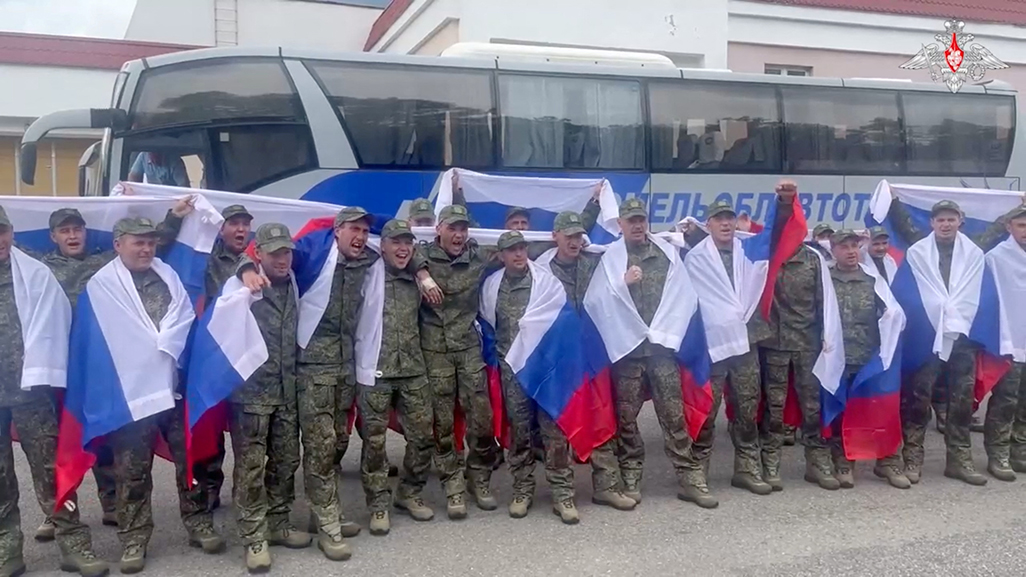Eleven jailed Russian dissidents have written to world leaders appealing for a mass release of Russian political prisoners and Ukrainian civilians held by Russia – some 10,000 people in total, they say – as part of any peace deal between Moscow and Kyiv.
In the letter, published via Reuters, the dissidents said that alongside prisoners of war, thousands of Ukrainian civilian “hostages” were being held by Russia, mostly in Russian-held areas of Ukraine.
Talks in May and June on ending Russia’s full-scale invasion of Ukraine made no progress towards a ceasefire, despite a pledge by U.S. President Donald Trump to end the war, but the two sides have exchanged captured soldiers and war dead.
“We call on both sides of the negotiations between Russia and Ukraine to immediately conduct an exchange of prisoners of war and civilians according to the formula ‘all for all’, including Ukrainian civilian hostages,” the letter said.
Among the signatories was Alexei Gorinov, 63, who in 2022 became the first person to go to prison under laws passed shortly after the Ukraine invasion that made it a crime to spread “false information” about the armed forces.
The youngest to sign was Darya Kozyreva, 19, who was sentenced in April to two years and eight months in prison for using graffiti and 19th-century poetry to protest against the war in Ukraine.
They placed themselves alongside thousands of Ukrainians who, according to human rights groups, have been detained by Russia, mostly in Russian-controlled regions of Ukraine.
“There are at least 10,000 of us – Russian political prisoners and Ukrainian civilian hostages. We are all punished for one thing – for taking a civic stance,” they wrote. Moscow has not commented on the alleged figure.
The dissidents called for “the immediate and unconditional release of sick political prisoners who are dying in Russian prisons” in their statement, which was backed by a message from Russian Nobel Peace Prize winner Dmitry Muratov.
Muratov’s message and the letter urged leaders in Russia, Ukraine, the European Union, the United States and elsewhere to act.
RUSSIA’S PEACE TERMS
At the peace talks in Istanbul last month, Russia handed Ukraine a memorandum proposing “a mutual amnesty of ‘political prisoners’ and release of detained civilians” as a possible condition for a ceasefire in the three-and-a-half-year conflict.
Asked about the status of the proposal and how many people it would cover, Kremlin spokesman Dmitry Peskov said on Thursday: “We don’t publicly discuss the… content of the memorandum, which we haven’t even discussed with the Ukrainian side yet. We believe that discussion through the media can only harm the process.”
The proposal was part of a wider package of Russian demands that Ukrainian President Volodymyr Zelenskiy described as an ultimatum. They include a halt to all Ukrainian troop movements except for withdrawals, and end to call-ups, foreign weapons supplies and martial law as well as the holding of new presidential and parliamentary elections.
No date has yet been set for further talks.
Describing their experience, the dissidents wrote: “The concepts of justice and fairness are absent in Russia today; anyone who dares to think critically can end up behind bars.”
Defendants in political cases had no chance of a fair hearing and were never acquitted, they said. Once in prison, their lives were in danger and they were at risk of denunciations from other inmates – something that led, in Gorinov’s case, to an additional three-year sentence.
The other signatories were sociologist Boris Kagarlitsky, self-described anarchist Azat Miftakhov, poet Artem Kamardin and activists Anna Arkhipova, Vladimir Domnin, Dmitry Pchelintsev, Andrei Trofimov, Ilya Shakursky and Alexander Shestun.
The Kremlin says cases are a matter for the courts and the prison service and Russia needs to apply its laws firmly to deter what it sees as subversive, Western-backed activity.
Elena Filina, an exiled opposition politician who helped gather the signatures from inmates scattered across Russia’s vast penal system, told Reuters the prisoners felt the peace talks may provide their last chance to be free.
“If peace agreements are signed without taking into account their amnesty, exchange or any other way of release, the window of opportunity will slam shut for a long time.”






Click here to change your cookie preferences